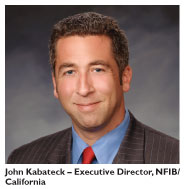By: John Kabateck, Executive Director, NFIB/CA

As the deadline neared for Governor Jerry Brown to veto or sign the mounds of legislation that were on his desk this month, small business owners held their breath. Unpredictable at best, would Governor Brown have small business in mind as he decided? Or would they be a mere afterthought in the Capitol, as so many times before.
The good news is that a number of bills important to small business and supported by NFIB were signed by the Governor. Specifically, we witnessed the signing of Senate Bill 617 (Calderon and Pavley), which requires a thorough economic analysis for every regulation with an economic impact of over $50 million. It supports more transparent rulemaking, will improve oversight of agencies, and will encourage policymakers to implement the most cost-effective ways to achieve societal goals. Assembly Bill 36 (Perea), which conforms California law to federal law by exempting employee contributions towards covering adult children up to age 26 from being subject to state personal income taxes, was also supported by NFIB and signed.

We were also successful in stopping several bills that would have had devastating effects on small businesses in the state. Senate Bill 104 (Steinberg) was strongly opposed by NFIB and would have allowed employees within the agricultural industry to organize unions in the workplace through an undemocratic, intimidation-based “card check” process, not through a private balloting process. A bill requiring the tracking and reporting of dog sales by pet stores (Assembly Bill 1121 - Pan), would have added government mandates to an industry that is already heavily regulated. Finally, Assembly Bill 325 (Lowenthal) would have prohibited an employer from refusing to grant a request by any employee to take up to three days of bereavement leave or to interfere with or restrain an employee from doing so. It created an egregious, overreaching private right to sue the employer. All three of these bills were vetoed by Governor Brown.
Now for the not-so-good news. There were some bills that NFIB strongly advocated for – policy that would have helped give small businesses a shred of hope to one day crawl out of the hole they’re in - that sadly the Governor vetoed. The first and perhaps most important was Assembly Bill 135 (Hagman). The measure required one of the members of the California Air Resources Board (CARB) to be a small business owner. It is critical that one of the most powerful regulatory agencies, with enormous authority over the cost of doing business in California, has input from the business owners that it regulates. Environmentalists have been opposed to businesses being heard in the regulatory process, seeing them as the enemy of the environment, and the Sierra Club and others came out in full opposition to this bill. In the end, Governor Brown vetoed the bill, which is truly sad given that this would have incurred no new state costs and would have demonstrated that our leaders mean business when they talk up small business. Despite this setback, NFIB will continue our efforts to ensure that small business will have a seat at the table with government boards and entities whose decisions impact Main Street.
In addition, the Governor vetoed Senate Bill 14 (Wolk, DeSaulnier and Huff), which would have implemented performance-based budgeting in California government, effectively requiring agencies to prove the need for their own existence and budgets by focusing managers, supervisors, and workers on achieving desired goals, to show progress toward those goals, and highlight the choices available to improve the expenditure of public funds resources. NFIB supported this as good governance, but the Governor called it a “one size fits all” approach.
Assembly Bill 22 (Mendoza) prevents employers from using credit reports when hiring, removing an important tool used by employers in the critical hiring process. NFIB also opposed Senate Bill 459 (Corbett), which the Governor signed and will require any person employing labor by an independent contractor to provide a form at the time of hire, explaining, among other things, the difference between an independent contractor and an employee. More importantly, it penalizes employers for “willful misclassification” of employees as independent contractors with up to $25,000 in fines.
So at the end of the day, where is small business left? We were able to stop some bad bills and get some good laws signed. But will it be enough to give small business owners certainty and the desire to expand their businesses? Or were there too many mandates and other onerous regulations passed this year that will force California’s job creators to continue to lose more hope and certainty when it comes to expanding and hiring?
With an important election year right around the corner, now is the time for our leaders to walk the talk – and for all of us on Main Street to hold their feet to the fire to make it happen.
For more information about NFIB visit online at www.NFIB.com/newsroom.

|